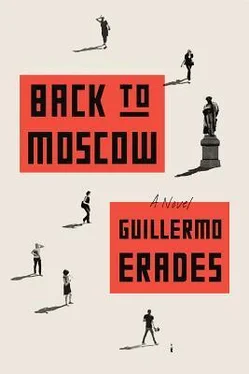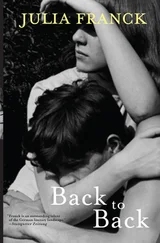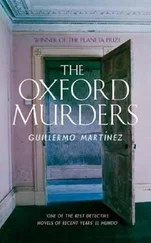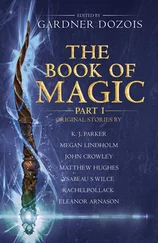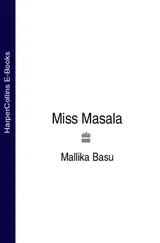I hadn’t told the brothers about Tatyana’s pregnancy. Not yet. They would feel betrayed, I thought. Especially Colin. Only the week before, he had called me again, on Thursday night, trying to drag me to Propaganda. ‘For old times’ sake,’ he’d said. I told him I wasn’t feeling good, maybe next week. I didn’t really mean it, and he knew it. I could feel his disappointment. But what the fuck, I’d wasted so many nights in Propaganda.
As the metro speeds up, I let go of the rail and I try to keep my balance, testing how long I can go without grabbing it again. I wonder if this mental transformation, the radical change of priorities in my life, is mostly a biological response to parenthood, an animal reaction over which I have little or no control.
The metro brakes to cross the bridge. Now I can hear the wheels toc toc tap on the rails, in beautiful rhythm. Tatyana is right, I think, it was all meant to happen. Her pregnancy fills me with tranquillity. So what if her love is purer than mine. With her I can live a virtuous existence, stop being superfluous. Everything is easier, I think, when choice is replaced by destiny. It feels as if, after rushing through life, my soul is slowing down.
I’ve been thinking about Siberia, the setting for a simpler life, where I could perhaps find the remnants of the real Russia. By starting a family with Tatyana, I think, I’m consciously stepping into the language-book universe of Russian As We Speak It — embracing not just the cultural and linguistic immersion, but also the simplification of my daily existence. One day, our lives will be nothing but a succession of daily routines, like the lives of Pavel and Marina: the post office, the supermarket, the restaurant, the park, the lake.
I glance around at the other passengers. Babushkas, old men, students, the mother with her child. They all look serious, grim. And so do I, I realise, spotting my reflection in the window. My face looks aged, my eyes sunken. My nose and mouth are connected by two deep shadows. Just then it occurs to me that, despite my new-found tranquillity, I too look sad and self-absorbed. As long as I don’t open my mouth, I think, other passengers will be unable to see that I’m not Russian. Like them, I’m wearing dark clothes. My entire wardrobe is now brown or black, the result of almost three years in Moscow. During this gradual, unconscious transformation of my appearance, my body language and my facial expression must have become more sombre too. With this thought running through my mind, I try to force a smile, a Western smile, from my previous life, a simple social gesture meant to demonstrate friendly feelings towards my fellow passengers in the metro. But my experimental smile, which I direct at the woman and boy across the wagon, must have come out somewhat forced and absurd, even threatening, I realise, because the woman instinctively grabs her child tighter and looks away. I stop smiling. After all, what the fuck should I smile for. I don’t need to prove anything to anyone.
I get off at Universitet. It’s been a while since I last visited the campus. The academic year has just started and I can feel the buzz and excitement in the young students rushing around.
‘Ready to work again?’ Lyudmila Aleksandrovna says when she sees me. Nothing has changed in her office — except the kettle, a newer cordless model.
I raise my right hand to my forehead, saluting as a soviet pioneer. ‘Always ready,’ I say. Then I tell her about the books I’ve been reading and she says my Russian has improved. She seems happy to see me. I can’t wait to finally start writing my PhD.
That night, back at home, I feel things falling into place. The beginning of a new life. I’m looking forward to winter, to the first snow of the season, to taking care of Tatyana as she gets bigger.
After dinner and a bit of TV, I sit on the couch, reading The Seagull . Tatyana lies with her head on my lap.
‘I’m so tired these days,’ she says, her eyes closed, her hand on her belly.
Then she falls asleep as I hold Chekhov’s book in one hand and stroke her curls with the other.
LENA EMERGED FROM THE metro and marched across the square towards me. She was wearing a grey skirt and a grey jacket that stretched tight across her breasts. She looked elegant, refined, as if she were going to work in an office. Beneath Pushkin’s statue, we kissed on the cheek. She suggested we go for a walk. We crossed through the perekhod, emerged on the other side of Tverskaya and strolled along the Boulevard. It was a fresh autumn morning, the path was carpeted with dry brown leaves.
She asked about my research at the university, about the brothers. I learned she was going to a new yoga centre now. She had finally found an instructor who was strict but inspiring.
We turned right at Malaya Bronnaya, kept on the sunny side of the street. It seemed to me that Lena walked with more confidence than before, with a hint of arrogance in her gait, more aware perhaps of the impact she had on men. I was waiting for the right moment to tell her about Tatyana and the baby.
Weeks after our encounter at the Boarhouse, Lena had finally answered one of my messages and agreed to see me. I felt a strong need to end Lena’s chapter in my life before I could move on to the next. But now that Lena was next to me, I didn’t know where to start. I was enjoying her presence, always so physically intense, and all the memories that it triggered.
We reached Patriarshiye Prudy. The trees in the square were golden brown. We circled the pond, our feet crunching on dead leaves. The sun sparkled on the water. We passed the playground, full of children, then sat down on a bench facing the pond. Beneath the silvery surface, the water was dark and muddy. We stared at it in silence.
I wanted to tell Lena how it felt to know that I was going to become a father. I wanted to tell Lena how I had matured, how the person she used to know no longer existed. I wanted to tell Lena how I had learned to accept my destiny.
‘Lena,’ I said, ‘you are a prostitute.’
She looked at me, her expression calm and peaceful. Then she bit her lower lip. ‘What do you mean?’
‘When I saw you last time,’ I said. ‘At the Boarhouse. With those guys.’
‘I’m not a prostitute.’ Her voice was soft.
A few metres away, a boy and a girl were feeding pieces of bread to a flock of excited ducks.
‘How long have you been doing this?’ I asked.
She shifted on the bench, as if hesitating between answering my question or standing up and walking away. ‘Why do you care?’ she said, staring at the pond. ‘I’m a free person, Martin. I see whoever I want.’
‘Were you sleeping around when we were together?’
‘Is that why you wanted to see me?’ she said. ‘Bozhe moi.’
‘Were you?’ I insisted. ‘Were you seeing other guys back then?’
‘Of course not,’ she said, her tone restrained. ‘Martin, I was in love with you. I’m still in love with you. I don’t think my feelings for you will ever change.’
‘Since when?’
‘Since when do I love you?’
‘Since when do you sleep with men for money?’
Lena was shaking her head, her eyes now fixed on a clump of brown leaves floating next to the shore.
‘Martin, do you know when I fell for you, when I first realised that one day you would hurt me?’
‘When we met in Propaganda and I whispered those lines from Pushkin in your ear?’
‘No, Martin. It wasn’t Pushkin. It was when I saw you the next day, when I caught you playing with plastic bricks in Dyetsky Mir. The night we met I thought you were interesting, but not dangerous. But the next day, when I saw you in the toyshop playing with those bricks, so lost, like a child, I knew instantly that you had me, and that sooner or later you would cause me pain.’
Читать дальше
